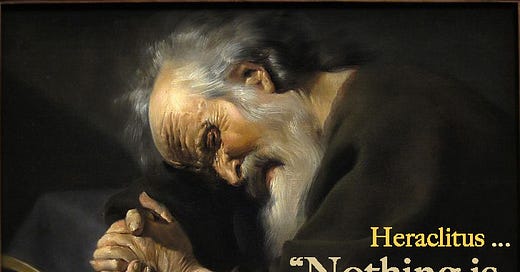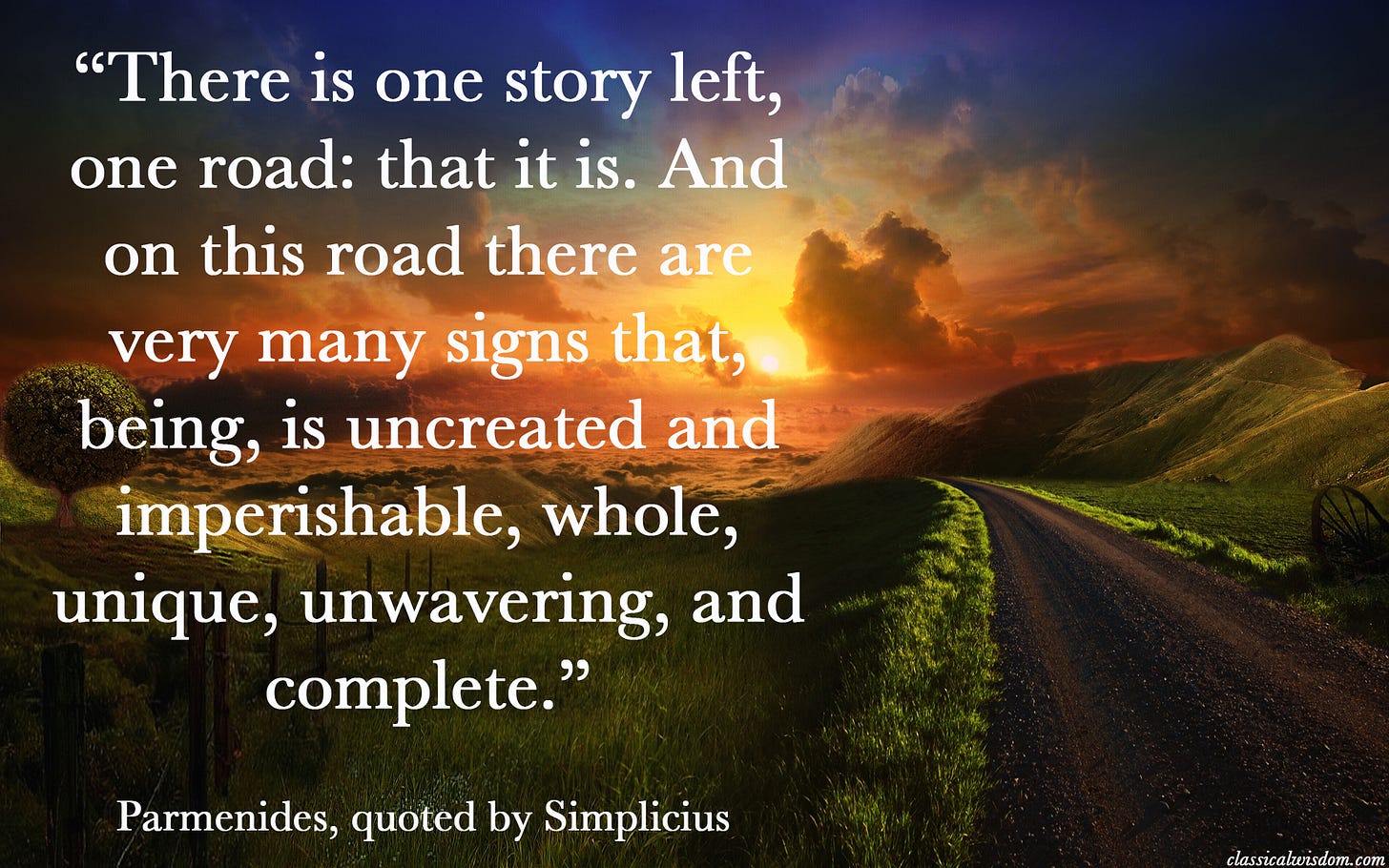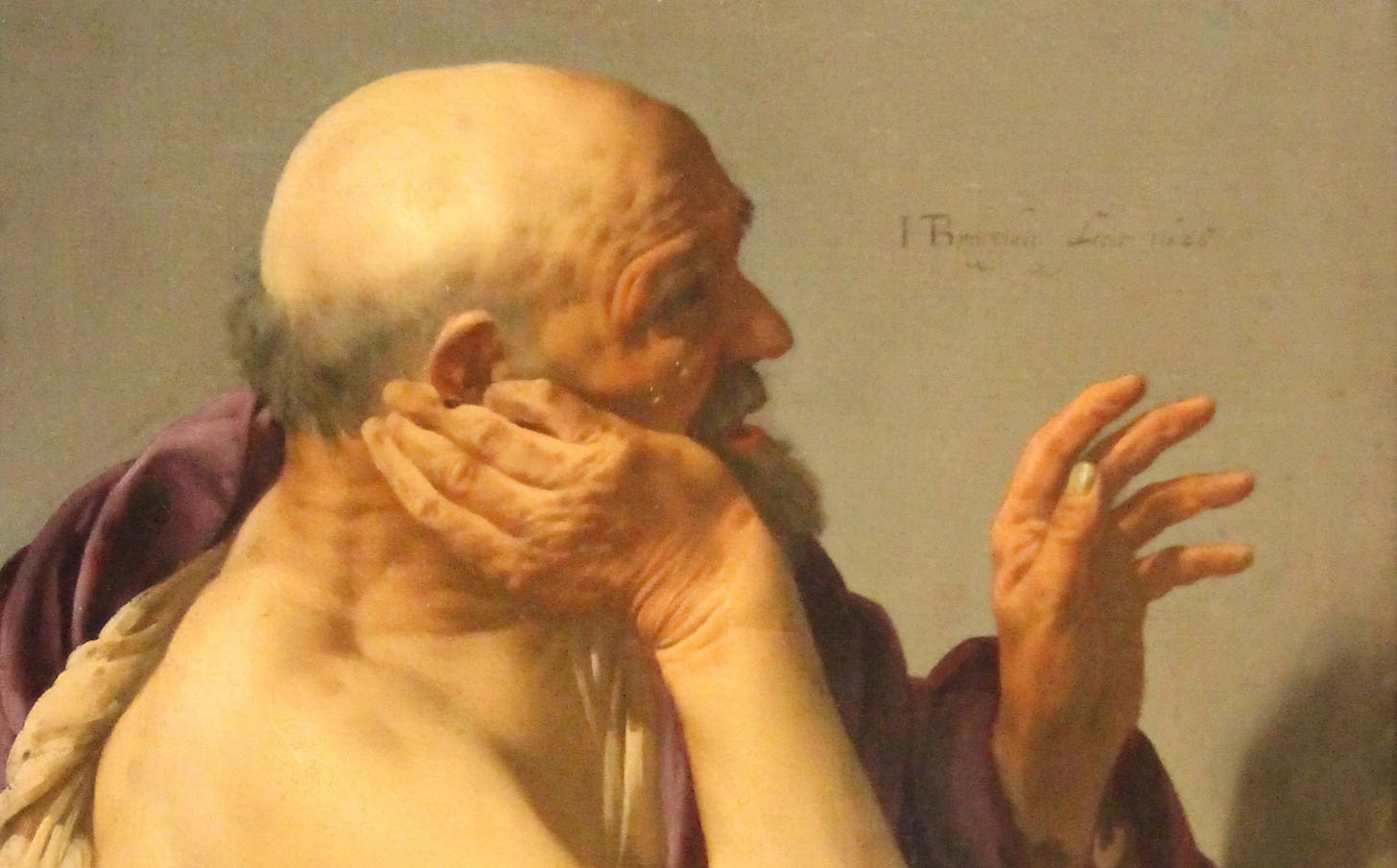Joel Bowman with today’s special Note From the End of the World: Buenos Aires, Argentina…
Well… we don’t know about you, but we’re still reeling from the great debate. Truly, it was one for the ages.
The eloquence of the two orators… the rhetorical flourishes… the deft exchange of ideas and firm grasp of the concepts at hand… it was, in a word, epic.
We write, of course, of the storied standoff between the pre-Socratic philosophers, Heraclitus and Parmenides, intellectual giants of the ancient world. The topic at hand: nothing less than the state of the universe itself… metaphysics… free will vs determinism.
As our dear readers will have no doubt noticed, we harbor a shameless bias here at Notes From the End of the World. That is, an ill-concealed affinity for the classical texts.
You’ve probably seen the references bubbling to the surface in our various missives; sirens calling hapless heads of state to shipwreck… the Herculean tasks laid at the feet of a once great nation… Thucydides' Trap lying in wait for an empire facing a “power transition”…
From ancient coin clipping… to hubristic politicos… to Athenian-style democracy (and the death of their beloved Socrates, by vote!)… the ancient world is replete with lessons for our modern times, provided we take the time to study and heed them.
After all, how else are we to make heads or tails of what passes for “news” today… if we don’t know a darned thing about the “olds”?
So it was a decade or so ago, over an unhurried lunch at our favorite parrilla down in Buenos Aires, that your author’s dear wife, Anya Leonard, teamed up with our longtime friend, Bill Bonner, to co-found Classical Wisdom, a publication dedicated to bringing “Ancient Wisdom to Modern Minds.”
Classical Wisdom has gone through many iterations since that auspicious occasion, and is now a fully independent publication, led by dear wifey… who sits about 10ft away from us in our office down here in Argentina’s classically inspired capital. And best of all, it’s now available to read and cherish on your favorite independent publishing platform, Substack!
So please, give the doom scrolling a rest… leave petty partisan politics and presidential vices for another day… and indulge in some perspective-giving classical wisdom, below…
P.S. You can also join the growing Classical Wisdom community (now over 72,000 readers!) by becoming a member today…
Classical Wisdom Standoff: Heraclitus vs. Parmenides
By Van Bryan
The philosophers of ancient Greece were some of the first thinkers to attempt to rationalize the universe around them. Their determination to make sense of a world that might appear chaotic represented a dramatic step towards scientific thinking and enlightenment. It is for this, that they are time and again remembered. They were often stoic, thoughtful individuals who would work together to develop and refurbish their philosophies.
Every once in a while, however… they would disagree.
This article is part one of three in which we examine the philosophies of Heraclitus (535-475 BC) and Parmenides (515-445 BC). These men were similar in many regards. They were both Presocratic philosophers who asked the very fundamental question: what exactly is the universe? This branch of philosophy is known as ‘metaphysics’, and it basically seeks to explain the nature of reality. Both philosophers came to the conclusion that all the universe can be reduced to one thing; this is called “Monism”, which was first made notable by our good friend, the philosopher Thales.
Now, while both philosophers came to the conclusion that the universe can be reduced to one thing, they had a very serious disagreement about what exactly that thing was. Their disagreement on metaphysics would be extrapolated to include some very interesting implications.
The Philosophy
Heraclitus
Heraclitus believed that the universe was governed by a divine logos or reason. This fundamental law of the universe held all things in perfect balance. According to Heraclitus, the unity of the universe is composed of a balancing of opposites. Day becomes night and hot will become cold. The continuous changing of reality was the one fundamental constant within the cosmos. This belief led Heraclitus to the conclusion that all things are always in flux and that the only thing that did not change was change itself.
To Heraclitus, the nature of reality was in a constant war of change. Fire would turn to air, air would become water and water would become one with the earth. Similarly, life is followed by death and with every death there is a birth of life. This war within the nature of reality encompassed all things. It was not a process, because that would indicate that things only proceed in one direction. Rather, the universe and its constant changing was more like a circle, shifting back and forth constantly and without rest.
Heraclitus attempted to demonstrate his idea that all the universe was in flux. He used the example of a river. The philosopher stated that…
“No man ever steps in the same river twice, for it’s not the same river and he’s not the same man”.
~ Heraclitus (535-475 BCE)
By this he means that the moment you step into a river, the water is displaced with new water and the nature of the river is changed permanently. The man stepping in the river is also consistently changing. The man loses skin cells, his skin is made wet by the river, and he has aged ever so slightly since stepping in the river. Small, unavoidable changes in both the man and the river make them different from the way they were before.
This would appear to demonstrate Heraclitus’s belief that all things are changing, and that the one fundamental law of the cosmos was that everything is flux.
Heraclitus believed that fire was the incarnation of a divine will that caused all change within reality and that the one undeniable law of the universe was that everything was always transforming into something else. Parmenides, had something of a disagreement on this point...
Parmenides
Parmenides took quite the opposite view of Heraclitus. Through deductive reasoning, Parmenides concluded that something that exists (it is) cannot also not exist (it is not). This would involve a logical contradiction. This thinking would lead Parmenides to conclude that a state of nothingness was impossible. A void in the universe or reality could not be. Parmenides then concluded that something could not have been created from nothing, the universe could not have sprang from an empty void. Additionally anything that exists could not logically go into a state of non existence. Therefore all that exists must have always existed in some form or another.

This idea of permanence means that something that is permanent can not change into something else without it ceasing to be permanent. Fundamental change, therefore, is impossible. All things are, they have existed and will always exist in one form or another. This idea of unchanging permanence led Parmenides to conclude that there is an indivisible unity within the universe.
This idea can be rather difficult to process. It is hard to precisely grasp the concept that the universe is unchanging and that a state of nothingness is a logical impossibility. It would appear to be easy to disprove. If you ever met Parmenides, you might say to him “unicorns don’t exist (they exist as nothing). There, I proved you wrong”.
Parmenides would explain that the word “unicorn” does not refer to an actual object. Words always must hit a mark, so to speak. The word “unicorn” refers to a picture in your head, a concept. A word must have some basis of reality to it, the word “unicorn” is a representation of an idea, and therefore it exists.
Aristotle would later say that it is impossible for A to be B AND A is not B. Parmenides would say that we could not state that A is not B, period. Basically if you were to tell Parmenides that an elephant could not be a butterfly (A is not B), then he would follow the same argument as before and explain that this elephant-butterfly was really a concept in your mind and therefore existed. The philosopher says himself.
“For it is the same thing that can be thought and that can be.”
~ Parmenides (515-445 BC)
And so to Parmenides, there is no change. There is no constantly shifting universe. There is a universe that is continuous, unchanging and eternal. This idea is difficult for us to come to terms with. After all, our senses tell us that things are changing all the time. Heraclitus attempted to counter Parmenides on that point exactly.
It is said that Parmenides took the stance that motion was impossible, as motion is a type of change, and Heraclitus sought to disprove him. Heraclitus took his arm, moved it about his face and essentially said ‘there, I disproved it’. Parmenides then says that just because an arm is in one location one moment and then a different location the next, it does not necessarily mean that the arm actually moved.
To Parmenides, knowledge gained through the senses was unreliable. Moreover, our empirical observations were actually deceptive. Just because we observe motion, doesn’t mean motion is a reality. The philosopher believed that to find truth, we must start from an epistemological ground zero, then rely only on our reason and logic to arrive at a worthy conclusion. And that conclusion, to Parmenides, was that all things are, there is no change, the universe is composed of an indivisible unity- “all is one”.
Both philosophers concluded that the universe could be broken down into one fundamental thing. They presented radically different ideas about what that thing was, however.
Implications
So who is right? Parmenides’ argument that it is impossible for something to go out of existence is basically a rehashing of the scientific law of the conservation of matter and energy. This would also imply that the universe as we know it is set, not capable of change. All events have already been predetermined because change is a logical impossibility.
This is the basis of what is called fatalism. If you combine this thought with the idea that every event is caused by a previous event then you have determinism. The universe, as Parmenides would suggest, is predetermined and there is no chance that it will ever change. The problem most people have with ‘determinism’ is that it is basically at odds with the idea of free will.
And so to counter this, Parmenides makes the stunning claim that free will is an illusion. We may think we are making our own choices, but really our thoughts and actions are predetermined. Everything we think or do is caused by the eternal nature of the universe. Our thoughts may seem like our own, yet they are subject to cause and effect just like everything else.
Enter Heraclitus. This philosopher believed quite the opposite, as we know. The universe is consumed by change! All things are flux! “The way up and the way down are one in the same!” If we are to believe Heraclitus then we do, in fact, have free will. And yet the argument for free will is actually harder to make than you might think.
In order for free will to exist, our thoughts and actions must be the result of our will and our will alone. Yet, all things in the universe appear to be subject to cause and effect. So why would our thoughts and actions be any different? It would seem that in order to have free will, we would be defying the laws of reality, which is that all events are caused by previous events. And if we are capable of defying the laws of reality, then that would suggest that we are god-like.
The theory that we are miraculously not subject to cause and effect is often referred to as the “little god theory”. We create our own universe and the unchanging reality that was described by Parmenides has no sway over us.
So is everything constantly changing or is the universe predetermined, incapable of change? Are we the masters of our own life, using free will to defy the logic of cause and effect? Or are we all integral parts of a future that has already been written?
You are asking yourself these questions now… and as one more example; did you ask those questions to yourself of your own volition, your own free will? Or were those questions a direct result of reading this article? Did you choose to consider these thoughts? Or was it a result of forces beyond your control?
These are the questions that have plagued mankind. However, as is the case with most philosophy, we will probably never know the answer definitively. What we must always remember is that oftentimes finding answers is not what is important. It is the questions themselves which are important. Philosophy is an action. We philosophize not always to find truth conclusively, but simply for the sake of it, for the sake of the questions.
As Socrates would say, wisdom is not knowing everything. Wisdom is accepting that we know nothing.
Van Bryan for Classical Wisdom
Final Notes…
Since launching here on Substack just two years ago, Classical Wisdom has grown to be the second-largest publication in the philosophy category, with a massive 72,000 members.
In fact, each month Classical Wisdom is viewed over half a million times…
…proving that the legacy of ancient texts and thirst for timeless knowledge is still going strong, even in this age of know it all politicians and their reductionist, bumper sticker sloganeering.
An ancient antidote to the woke world… a valuable perspective amid the mainstream media cacophony… a moment of calm and reflection in the go-go digital age…
Classical Wisdom offers ancient wisdom for modern minds…at a time when we could hardly need it more. Join Classical Wisdom’s growing community and gain some real perspective today, right here…
Cheers,
Joel Bowman









I was confused before, therefore I am.
Joel, I found it interesting to read both points of view. It would a breath of fresh air to have these two men replace our 2 present canidates for our Presidential election. Imagine that, to have canidates who discuss the Universe, instead of claptrap (whatever that means)